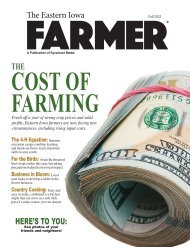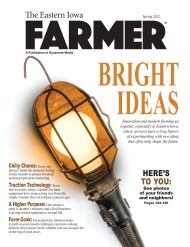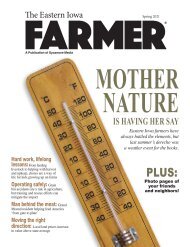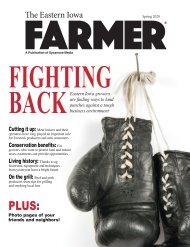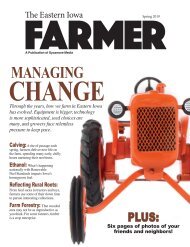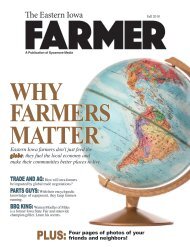Eastern Iowa Farmer Fall 2020
Create successful ePaper yourself
Turn your PDF publications into a flip-book with our unique Google optimized e-Paper software.
By Kristine A. Tidgren<br />
Staff Attorney<br />
Center for Agricultural Law & Taxation<br />
<strong>Iowa</strong> State University<br />
eastern <strong>Iowa</strong> farmer<br />
The <strong>Iowa</strong> Legislature was hard at work<br />
this busy spring, passing bills that<br />
Gov. Kim Reynolds signed into law.<br />
Below is a summary of new laws<br />
impacting the state’s agricultural producers<br />
and rural landowners. Most of these laws<br />
were effective July 1.<br />
Prohibiting permit requirements for agricultural<br />
experiences<br />
This law prohibits counties from requiring a<br />
permit for agricultural producers offering “agricultural<br />
experiences.” An agricultural experience<br />
is defined as “any agriculture-related activity, as<br />
a secondary use in conjunction with agricultural<br />
production, on a farm which activity is open to<br />
the public with the intended purpose of promoting<br />
or educating the public about agriculture,<br />
agricultural practices, agricultural activities, or<br />
agricultural products.”<br />
This law would prevent a county from requiring<br />
a farmer to obtain a permit to host a harvest<br />
dinner or groups of students on his or her farm.<br />
The scope of agricultural experiences covered<br />
by the law, however, is unclear. During debate,<br />
legislators stated that weddings or rock concerts<br />
would not be covered. The law specifically<br />
prevents the imposition of special exceptions,<br />
variances, conditional use permits, or special use<br />
permits, but it is unclear whether a county could<br />
impose other requirements upon these producers.<br />
Preventing county zoning regulation<br />
of agricultural-exempt property<br />
Counties generally have the authority to<br />
develop zoning regulations for their rural areas,<br />
but farms have been exempt from this reach.<br />
This means that an exempt farmer can build an<br />
ag building or a grain bin on his or her property<br />
without getting a permit from the county.<br />
<strong>Iowa</strong> law has long exempted from county zoning<br />
regulations all land, farm houses, farm barns,<br />
New <strong>Iowa</strong><br />
laws impact<br />
agricultural<br />
producers<br />
farm outbuildings or other buildings or structures<br />
that are primarily adapted, by reason of nature<br />
and area, for use for agricultural purposes. The<br />
new law adds that a county shall not require an<br />
application, an approval, or the payment of a fee<br />
in order for an ordinance to be deemed inapplicable<br />
to land, farm barns, farm outbuildings, or<br />
other buildings or structures that are primarily<br />
adapted for use for agricultural purposes. Land<br />
enrolled in a soil or water conservation program<br />
qualifies for the agricultural exemption.<br />
The intent of this provision is to prevent counties<br />
from imposing additional zoning burdens on<br />
otherwise-exempt agricultural activities. It was<br />
written specifically in response to a county’s unified<br />
development ordinance, which would have<br />
required an application and a hearing for any<br />
farm of less than 40 acres to build a new building,<br />
such as a confined animal feeding operation.<br />
Critics of the law point out that the definition<br />
of whether property is adapted for agricultural<br />
purposes is sometimes unclear and that a hearing<br />
might be helpful to a property owner seeking<br />
confirmation that the property is exempt. It is<br />
not clear under the new law whether voluntary<br />
hearings or applications for determining exempt<br />
status would be allowed or whether all enforcement<br />
would occur after the building is built.<br />
Updated Hemp Law<br />
This new law amends the <strong>Iowa</strong> Hemp Act,<br />
which was passed last year to facilitate the legal<br />
production of hemp in <strong>Iowa</strong>. The plan was approved<br />
by the USDA on March 20. The new law<br />
allows the manufacture, sale, and consumption<br />
of “consumable hemp products” by humans if all<br />
the following conditions apply:<br />
n The consumable hemp product was manufactured<br />
in <strong>Iowa</strong> in compliance with <strong>Iowa</strong> Code<br />
chapter 204.<br />
n The hemp contained in the consumable<br />
hemp product was produced exclusively in <strong>Iowa</strong><br />
in compliance with <strong>Iowa</strong> Code chapter 204.<br />
n The consumable hemp product complies with<br />
certain packaging and labeling requirements.<br />
About<br />
CALT:<br />
n The Center for<br />
Agricultural Law and<br />
Taxation (CALT)<br />
at <strong>Iowa</strong> State<br />
University was<br />
created in 2006.<br />
It provides timely,<br />
critically objective<br />
information to<br />
producers,<br />
professionals and<br />
agribusinesses<br />
concerning the<br />
application of<br />
important<br />
developments in<br />
agricultural law and<br />
taxation (federal and<br />
state legal opinions<br />
of relevance, as well<br />
as critical legislative<br />
developments) and<br />
is a primary source<br />
of professional<br />
educational training<br />
in agricultural law<br />
and taxation.<br />
Contact CALT:<br />
<strong>Iowa</strong> State<br />
University<br />
2321 N. Loop,<br />
Suite 200<br />
Ames, IA 50010<br />
Phone:<br />
(515) 294-5217<br />
Fax: (515) 294-0700<br />
www.calt.iastate.edu<br />
102 <strong>Eastern</strong> <strong>Iowa</strong> <strong>Farmer</strong> | fall <strong>2020</strong> eifarmer.com








